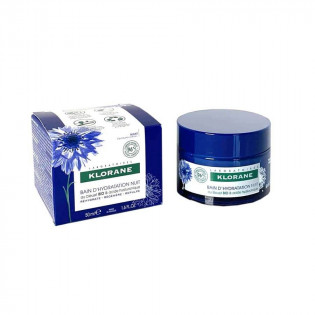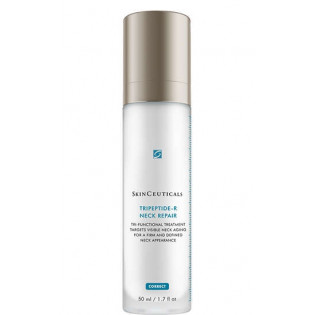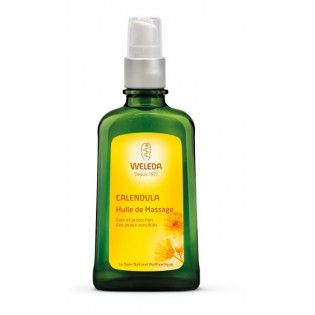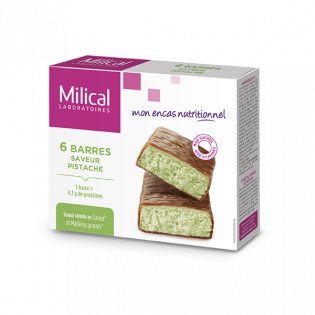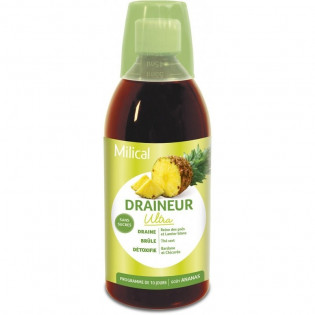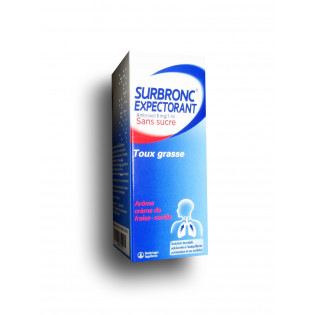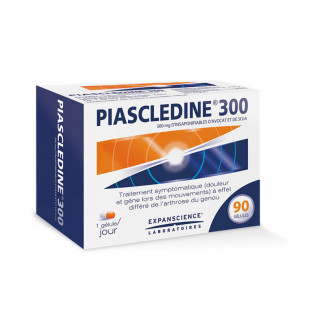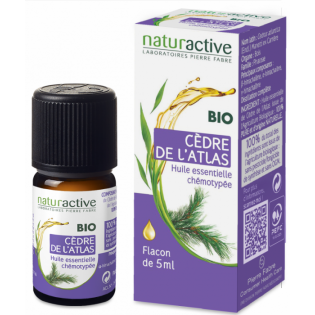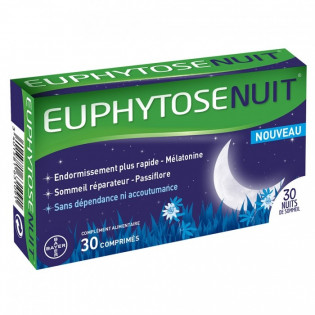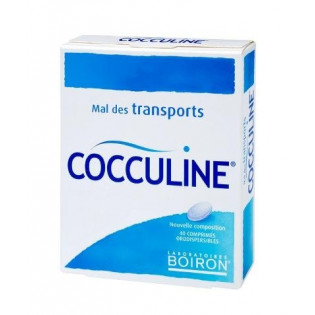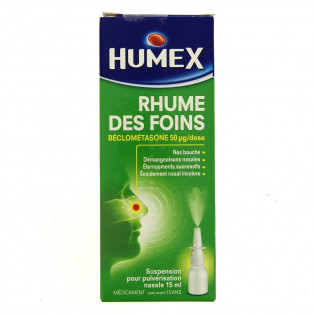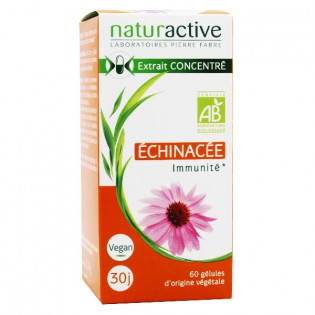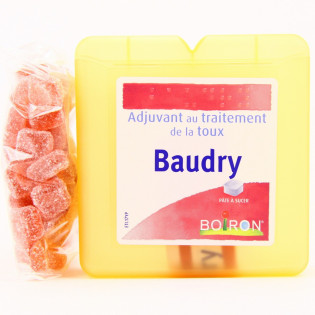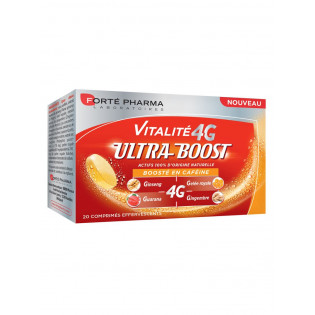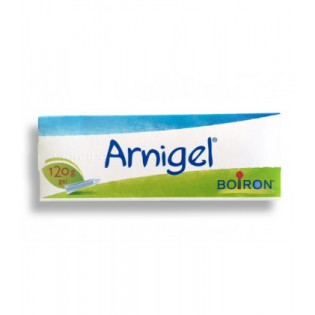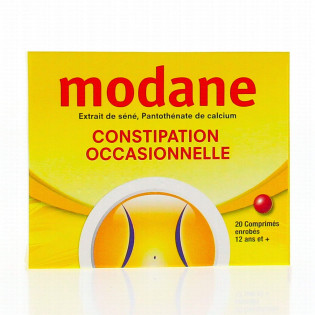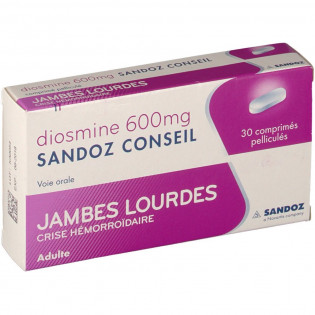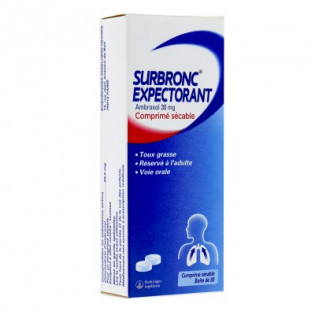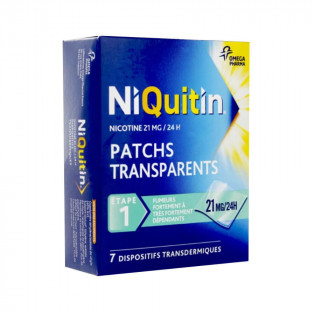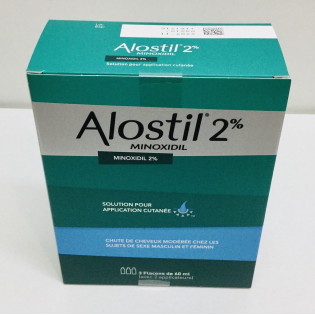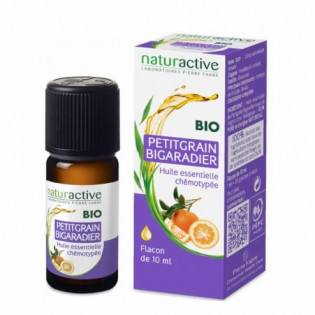In this manual :
1. WHAT IS EUPHYTOSIS, coated tablet AND WHAT IS IT USED FOR?
2. WHAT YOU SHOULD KNOW BEFORE TAKING EUPHYTOSE, coated tablet
3. HOW DO I TAKE EUPHYTOSE, coated tablet?
4. WHAT ARE THE POSSIBLE SIDE EFFECTS?
5. HOW TO USE EUPHYTOSE, coated tablet?
6. ADDITIONAL INFORMATION
1. WHAT IS EUPHYTOSE, coated tablet and WHAT IS IT USED FOR?
Pharmacotherapeutic class
Pharmacotherapeutic class
Herbal medicinal product.
Traditionally used to reduce minor anxiety and sleep disorders in adults and children.
2. WHAT YOU SHOULD KNOW BEFORE TAKING EUPHYTOSE, coated tablet
List of information needed before taking the medicine
Not applicable.
Never take EUPHYTOSE, coated tablet:
- If you have a history of allergy to any of its constituents.
- In children under 6 years of age because of the pharmaceutical form.
Precautions for use; special warnings
Be careful with EUPHYTOSE, coated tablet:
In children, a sleep disorder requires consulting your doctor.
Due to the presence of sucrose, this medicine should not be used in cases of fructose intolerance, glucose-galactose malabsorption syndrome or sucrase-isomaltase deficiency (rare metabolic diseases).
This medicine contains methyl parahydroxybenzoate and propyl parahydroxybenzoate and may cause allergic reactions
Interactions with other medicines
Taking other medicines
Talk to your doctor or pharmacist if you are taking or have recently taken any other medicines, including medicines obtained without a prescription.
Interactions with food and drink
Not applicable.
Interactions with herbal products or alternative therapies
Not applicable.
Use during pregnancy and lactation
Pregnancy
Ask your doctor or pharmacist for advice before taking any medicine. The use of this medicine should generally be avoided during pregnancy. If you discover that you are pregnant during treatment, consult your doctor, as only he or she can decide whether you should continue the treatment.
Breastfeeding
The use of this medicine should be avoided during breast-feeding.
Not applicable.
Effects on ability to drive and use machines
Not applicable.
List of excipients with a known effect
Important information about some ingredients of EUPHYTOSE, coated tablet
Excipients with a known effect: sucrose, methyl parahydroxybenzoate (E 218), propyl parahydroxybenzoate (E 216).
3. HOW TO TAKE EUPHYTOSE, coated tablet
Instructions for proper use
Not applicable.
Dosage, Method and/or route(s) of administration, Frequency of administration and Duration of treatment
Dosage
Always follow the dosage indicated by your doctor. In case of doubt, consult your doctor or pharmacist.
RESERVED FOR ADULTS AND CHILDREN OVER 6 YEARS OF AGE.
The usual dose is:
In adults:
- Symptomatic treatment of minor anxiety disorders:
o 1 to 2 tablets per dose, 3 times a day.
- Symptomatic treatment of minor sleep disorders:
o 1 tablet with the evening meal and one tablet at bedtime.
In children over 6 years of age:
- Symptomatic treatment of minor anxiety disorders:
o 1 tablet per intake, 3 times a day.
- Symptomatic treatment of minor sleep disorders:
o 1 tablet with evening meal.
If there is no improvement after one month of treatment, ask your doctor for advice.
Method of administration
Oral use
To be swallowed without chewing, preferably with water or a hot drink.
Frequency of administration
Not applicable.
Duration of treatment
Not applicable.
Symptoms and instructions in case of overdose
Not applicable.
Instructions in case of missed dose(s)
If you forget to take EUPHYTOSE, coated tablet:
Do not take a double dose to make up for the dose you forgot to take.
Risk of withdrawal syndrome
Not applicable.
4. WHAT ARE THE POSSIBLE SIDE EFFECTS?
Description of side effects
Like all medicines, EUPHYTOSE, coated tablet is likely to have undesirable effects, although not everyone is subject to them.
If you notice any side effects not listed in this leaflet, or if any side effects become serious, please tell your doctor or pharmacist.
Very rarely, EUPHYTOSE, coated tablet causes liver disease, especially in children and when the recommended dosage is exceeded, and rarely digestive disorders and allergic skin reactions.
5. HOW TO USE EUPHYTOSE, coated tablet
Keep out of the reach and sight of children.
Do not use EUPHYTOSE, coated tablet after the expiry date stated on the box. The expiry date refers to the last day of the month.
Store below 25°C and protect from moisture.
If necessary, warnings against certain visible signs of deterioration
Medicines should not be disposed of down the drain or in the household waste. Ask your pharmacist what to do with unused medicines. This will help protect the environment.
6. ADDITIONAL INFORMATION
Full list of active substances and excipients
What does EUPHYTOSE, coated tablet contain?
The active substance is:
Valerian(Valeriana officinalis L.) (hydroalcoholic dry extract (60% V/V) of)* ................................... 50.00 mg
Passionflower(Passiflora incarnata L.) (hydroalcoholic dry extract (60% V/V) of)* ................................. 40,00 mg
Hawthorn(Crataegus sp. ) (aqueous dry extract of)* ............................................................................. 10,00 mg
Horehound(Ballota nigra L.) (aqueous dry extract of)* ............................................................................. 10,00 mg
For one bare tablet of 321 mg and one coated tablet of 515.4 mg.
*On maltodextrin or on maltodextrin and colloidal anhydrous silica.
Other components are:
Heavy magnesium oxide, corn starch, microcrystalline cellulose, magnesium stearate, purified water, shellac, gum arabic, gelatin, sucrose, talc, carnauba wax, mixed titanium dioxide and iron oxide**
*Iron oxide (black, yellow, red), titanium dioxide (E171), sodium benzoate (E211), methyl parahydroxybenzoate (E218), propyl parahydroxybenzoate (E216), sucrose.
Pharmaceutical form and content
What is EUPHYTOSE, coated tablet and what does it contain?
This medicine is presented as a coated tablet.
Box of 30, 40, 60, 120 tablets in a tube (polypropylene).
Box of 30, 40, 60, 120 tablets in blister packs (PVC/Aluminium).
Name and address of the marketing authorisation holder and of the manufacturing authorisation holder responsible for batch release, if different
Holder
BAYER FAMILY HEALTH
33, rue de l'Industrie
74240 GAILLARD
Operator
BAYER SANTE FAMILIALE
33, rue de l'Industrie
74240 GAILLARD
Manufacturer
LABORATOIRES MACORS
Rue des Caillottes
Z.I. Plaine des Isles
89000 AUXERRE
or
SOPHARTEX LABORATORIES
21, rue du Pressoir
28500 VERNOUILLET
or
BAYER SANTE FAMILIALE
33, rue de l'Industrie
74240 GAILLARD
or
LABORATORIES M. RICHARD
Rue du Progres
Z.I. des Reys de Saulce
26270 SAULCE SUR RHONE
Names of the medicinal product in the Member States of the European Economic Area
Not applicable.
Date of approval of the package leaflet
The last date on which this package insert was approved was {date}.
MA under exceptional circumstances
Not applicable.
Detailed information on this medicinal product is available on the website of Afssaps (France).
Information reserved for health professionals
Not applicable.
Health education advice:
In children
The advice of a doctor is necessary before using EUPHYTOSE, coated tablet in children.
In adults
Minor anxiety disorders:
Mild anxiety states are normal reactions to stress in everyday life.
Normally, the body reacts in such a way that the individual adapts. In some cases, this adaptation is more difficult and signs of mild but uncomfortable anxiety may appear. These are most often
- A feeling of a tight throat or a lump in the throat
- Digestive problems (nausea, bloating, heartburn, diarrhea, etc.)
- Sleep disturbances
- Irritability or change of character
- Various temporary pains.
Anxiety states, when they persist, require the help of a doctor in order to diagnose and analyse the cause(s). Even in this case, it is not always necessary to resort to medication. When the symptoms described above are transient and/or immediately related to current concerns, they can be identified on their own.
When to see your doctor?
If there is no improvement after one month of treatment and if your condition remains unchanged or lasts several weeks and is accompanied by unhealthy behaviour (e.g. alcohol), you should consult your doctor. It is essential to consult a doctor who will propose an adapted global treatment.
The 5 rules to fight against stress:
- don't dismiss worries, express them: talk with someone you trust,
- set aside a special time each day to do something relaxing, a leisure activity, even for an hour,
- set aside time to be with your family and friends,
- make plans: outings (theatre, cinema, restaurant, etc.), holidays..
- make sure you eat a balanced diet and eat regularly.
Minor sleep problems:
Tips for sleeping well
Exercise during the day:
- Even moderate physical activity (walking, cycling...) helps to develop the need for sleep at night,
- Outdoor activities, in daylight, help regulate your sleep,
- From the end of the afternoon, avoid excitants such as tobacco or coffee, tea and caffeine-based sodas,
- Eat a light dinner and avoid eating meat or drinking alcohol.
Prepare for your night well before you go to bed:
- The evening should be devoted to relaxing activities that you enjoy; indeed, too much mental tension will interfere with the installation of sleep at bedtime,
- In particular, avoid intense physical or intellectual activity in the two hours before bedtime,
- Lie down when you feel sleepy, in bed, and read for 10 to 15 minutes before turning off the light.
Your day is prepared at night:
- Go to bed at a fixed time; your falling asleep obeys biological rhythms that must be respected. Regularity in bedtime helps the body to set and maintain natural rhythms,
- Sleep at the right temperature. A temperature between 18°C and 25°C, neither too hot nor too cold, makes it easier to fall asleep, limits night-time awakenings and thus favours the onset of restful sleep.
The 10 rules for sleeping well:
- In the morning, try to get up regularly at the same time,
- During the day, get out into the fresh air
- Try to get even 30 minutes of moderate physical activity every day,
- Avoid naps lasting more than half an hour or too late (after 4pm)
- Do not drink coffee, tea, caffeinated soda or tobacco after snack time
- Eat a light meal at least 2 hours before bedtime
- Do some relaxing activities after dinner
- Avoid a very hot shower or bath before going to bed, prefer lukewarm temperatures
- In the evening, try to go to bed regularly at the same time
- In your room, it is neither too hot nor too cold, i.e. between 18°C and 22°C, the environment is without light
- Get up when you can't sleep and when you wake up early.
Patient booklet:
Not applicable.
Pregnancy prevention program:
Not applicable.
Follow-up booklet:
Not applicable.
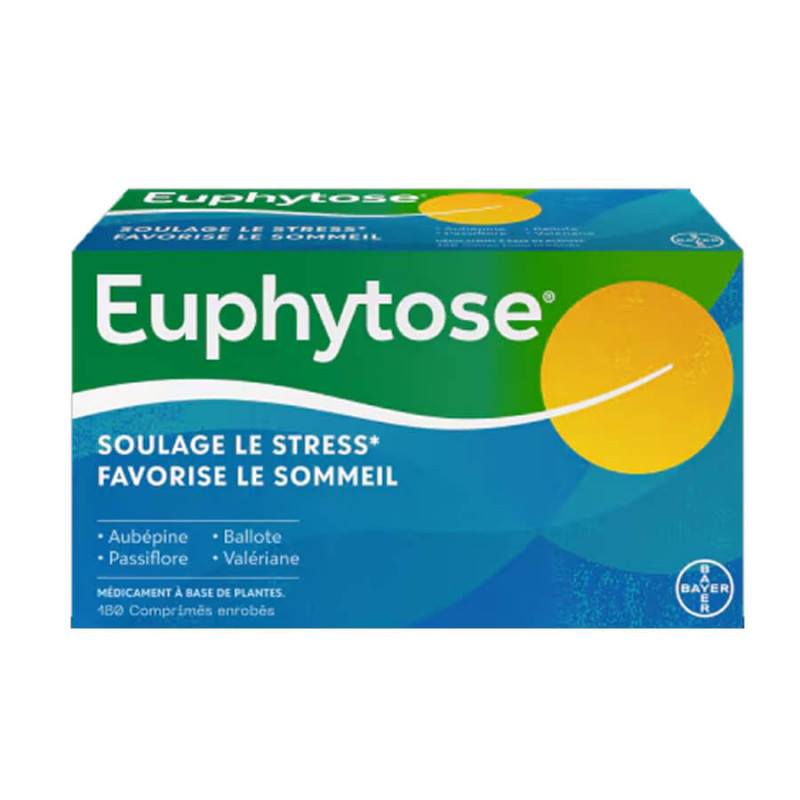
 Français
Français English
English
